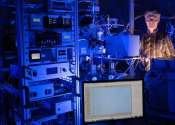New AI program helps identify elusive space plasmoids
In an ongoing game of cosmic hide and seek, scientists have a new tool that may give them an edge. Physicists at the U.S. Department of Energy's (DOE) Princeton Plasma Physics Laboratory (PPPL) have developed a computer program ...









